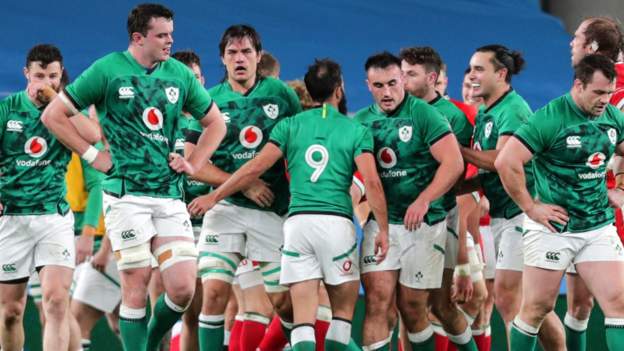
If Ireland players and coaches could ban one word from media conferences, you could bet handsomely it would be 'physicality'.
You can understand why it is an unpopular buzzword - in any normal setting the 114kg CJ Stander should not have to defend his ability to be physical.
Yet in recent times it is the stick with which Ireland have most frequently been beaten, and for good reason.
As their form dropped off a cliff in 2019, it was in this area that their shortcomings were most glaringly obvious.
In 2020, despite results and performances stabilising if not soaring, being physically outmuscled has remained the common denominator of their losses.
In this week more than most, physicality has been the word on everyone's lips, because this week's opponents are England.
England, who abruptly hauled Ireland off cloud nine at the start of 2019 to set the tone for a harrowing year that had been set up to be the finest in Irish rugby history.
England, who put 50 points on Ireland a month before the World Cup.
England, whose dominance in February's Six Nations meeting was far greater than the 24-12 scoreline suggested.
In each of these games, Ireland have been thoroughly undone in a physical contest that at times has looked a total mismatch, and the same can be said for their defeat by France in October.
"When you look at the two games that Ireland have lost [in 2020], in the end by reasonable margins, both times they kind of came unstuck against big physical teams that kind of just outmuscled them," former captain Rory Best told Rugby Union Weekly.
"That's what England have the ability to do.
"I think where England are at the minute, it's a bit like New Zealand a couple of years ago where if they play to the best of their ability I'm not sure there's a team in the world that can beat them."
'Who's going to adapt better?'
What is true for Ireland was proven true for the provinces in the last eight of the European Cup.
Ulster were beaten all ends up by Toulouse while the previously undefeated Leinster were bulldozed by Saracens in the first half of their quarter-final in Dublin, during which at various points Maro Itoje resembled a sixth-former playing against a team from a few years below.
It is not that Ireland cannot be physically dominant themselves; they did it last week against Wales. Such was Andrew Porter's dominance in the scrum that Rhys Carre was hooked before the interval to stem the flow of penalties.
There is ballast in the pack and unsurprisingly the players themselves remain bullish over their ability to win the battle against England.
"If we can get our set-piece going and make sure we get off the line, that gets us into the game and we can work from there," said Stander, who has been restored to the back row for the trip to Twickenham.
"We've played against them a few times, and the arm wrestle is going to come.
"It's just who's going to adapt to it better in that certain time on the pitch."
Set-piece must lay the platform
Last week after the disappointment in Paris, Irish fans were reminded that things are far from catastrophic as they handsomely beat a Wales team experiencing real problems in a post-Warren Gatland existence.
Ireland's issue, if you can call it that, is that their place among tier one nations is now extremely clear.
If you had asked someone to predict Ireland's 2020 results at the start of the year, they would have called it exactly as it has happened, with home wins across the board and away defeats by England and France.
The manner of those two losses is why Saturday's game at Twickenham is a big moment in the early reign of Andy Farrell.
Ireland did not run France of England particularly close, neither game finished with any doubt over who was the all-round better team, not just on the day.
While not a side in decline, Farrell's Ireland have yet to offer any indication that they are gaining ground on the teams above them. For that to happen, they have to at least stand toe-to-toe with England's physicality on Saturday - only when that platform is established will they be capable of making their opponents flinch.
"You can only be physical if you know what you're doing," said Stander.
"You can't go out there and start just looking for physicality, because again this game is physical.
"You have to have the ball and you need to have a good set-piece."















 Phone: (800) 737. 6040
Phone: (800) 737. 6040 Fax: (800) 825 5558
Fax: (800) 825 5558 Website:
Website:  Email:
Email: 






